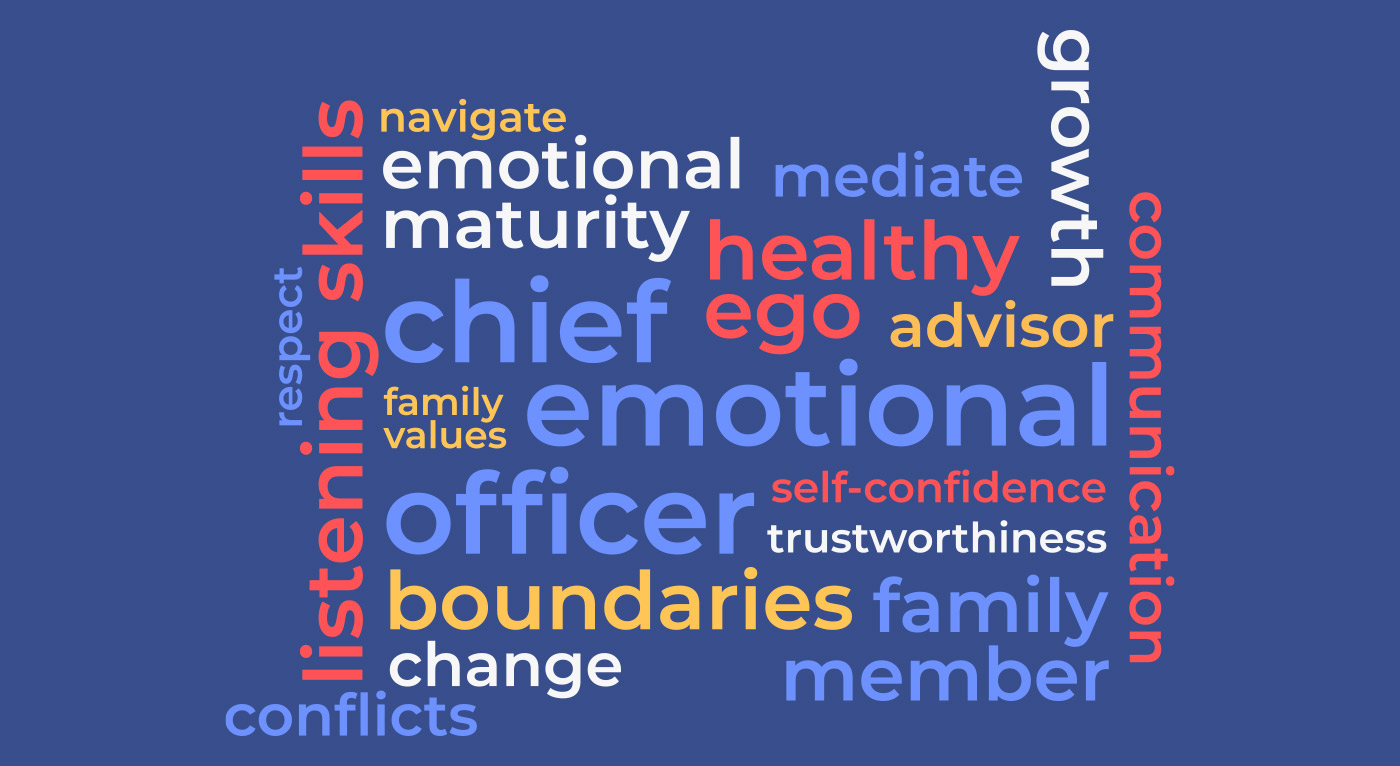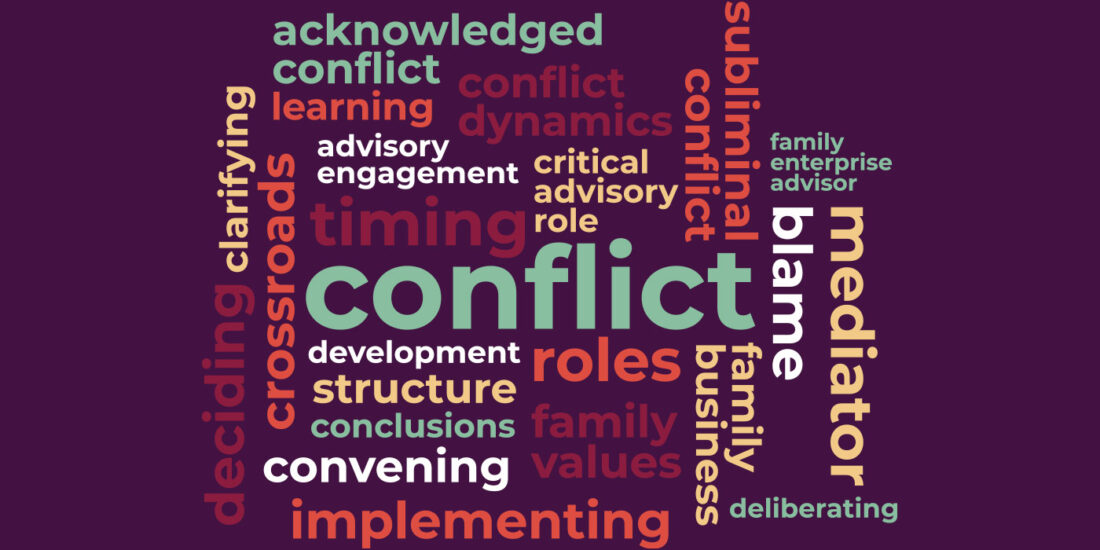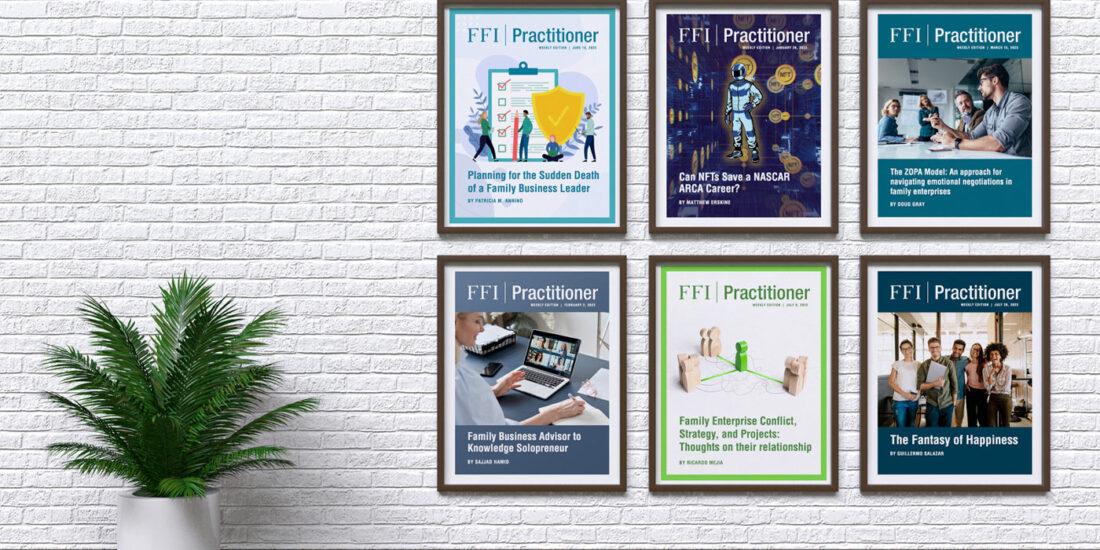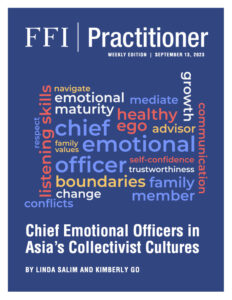
View this edition in our enhanced digital edition format with supporting visual insight and information.
Thanks to the FFI Asian Circle Virtual Study Group members, Linda Salim and Kimberly Go for this week’s edition that examines the important role of the Chief Emotional Officer (CEO) in Asian family enterprises. In their article, Linda and Kimberly utilize aspects of Bowen Theory and case examples to explore how the CEO can help families in collectivist cultures address conflict more effectively.
Asian cultures have long been associated with collectivism, a worldview where people see themselves as part of a larger group rather than focus on their individuality.1 Collectivistic cultures tend to place more importance on group harmony rather than self-gratification. As such, these cultures can be very supportive of family businesses, where decisions that prioritize family unity and sustainability are often made.
Yoshida Teigo of Tokyo University studied Japanese villages and found that these communities appear to live in harmony from generation to generation.2 However, “tensions lie below the surface, feelings run deep, [and] grudges persist.” Even though there is conflict, “the surface of relations is managed to exhibit harmony.”3 Yoshida proposed not to ask whether or not conflict exists, as it is part of life, but rather to study how it is handled within the collectivistic group. Yoshida’s perspective of limiting conflict while harboring ill feelings to preserve the appearance of harmony is a recurring reality expressed by Asian family business members.
According to research and observation of Asian family enterprises, attempts to discuss family conflict are often diverted into various harmony-making ways, risking conflicts being swept under the rug without being resolved. For example, in one Indonesian-Chinese family, a third-generation member tries to find out what conflicts exist between family members before they burn relationships. In another family, a first-generation member noted that as long as every family member has their own territory, they will not step into each other’s turf and conflicts can be avoided. In one Filipino-Chinese family, where tension between first-generation siblings have accumulated over decades, deliberation of business decisions is confined to short, infrequent calls and delivering messages through second- and third-generation members.
The Role of a Chief Emotional Officer
According to Leslie G. Mayer, a Chief Emotional Officer (CEO) is “an informal position filled by a family member or close [advisor].”4 The traits of a CEO include a high degree of emotional maturity, a healthy ego and self-confidence, trustworthiness, ability to maintain boundaries, excellent listening skills, good communication skills, and respect for family traditions and family values. Because families grow and change over time, a skilled CEO is one who can navigate and mediate arising conflicts when there are clashes in personality, changes in the value system, or violations of written or unwritten rules.
Sharing the CEO Role Across Generations
One family business in Indonesia has a generations-long tradition of Sunday dinner that started in the 1980s when the current patriarch, Andrew,* was in college. Andrew grew up with an entrepreneur father and a mother who instilled values of family unity, teaching her children to stick together and fend for one another. Andrew married a daughter of an entrepreneur who had grown up with a similar family culture. He and his wife adopted the tradition of family dinners into their family, and now, when his grown children visit their hometown, they attend Sunday dinner at Andrew’s place. At times, Andrew’s children expressed discontent at their burden of having to carry their family legacy, but watching their parents and grandparents support one another allows them to find meaning in their sacrifices. Andrew’s children not only saw their parents place importance on family unity, but they also experienced similar traditions in both sets of grandparents’ households.
Andrew and his wife act as co-CEOs. Andrew adopted his parents’ tradition of Sunday dinner, which allows his wife to step into more emotionally sensitive roles to help their children to understand how they can contribute to the family. The role of a CEO is very complex, and at times, impossible to be done by one family member without the rest of the family accepting and contributing the dynamic.
Daughter-in-Law as Emotional Regulator
The CEO can also be someone who marries into the family—an outsider’s perspective may offer more objectivity and balance when dealing with conflict. In a Filipino-Chinese third -generation family business, a member of the second generation, Amanda,* manages the emotions of the family. Amanda married into a family with a diamond business* that had been operating for 30 years. When she married her husband and moved in with his family, Amanda noticed heated shouting between her husband and his parents about how the business should be run. Feeling like an outsider who had to respect her in-laws, Amanda would try to calm and assuage her husband after a blowout.
Over time, her husband stopped working for the diamond family business due to tensions with members of the first generation. Amanda’s father-in-law decided to start a new business and asked her to help run the company. Amanda agreed, and her interactions with her in-laws increased through the years and covered matters of the household and of the new business. During their interactions, Amanda’s in-laws would complain to her about her husband’s lack of participation in their diamond business. At the same time, her husband would complain to her about his parents’ criticisms and excessive control over the business. Amanda listened to the complaints and politely pointed out when either party was mistaken about the other. She acted as a bridge, coordinating family and business matters between her in-laws and husband.
Following Bowen Theory, Amanda eased tension between her husband and in-laws by sharing the emotional burden in not only one, but two relationship triangles—the first comprising Amanda, her husband, and her father-in-law, and the second comprising Amanda, her husband, and mother-in-law—yet this approach did not resolve the conflict.5 Honest and direct conversation between Amanda’s in-laws and her husband did not happen because individuals from collectivist cultures tend to avoid direct confrontation. Collectivists “tend to view conflict as an aberration”—even an implicit acknowledgement of conflict “could cause a loss of face.”6 This was true for Amanda’s husband. In the past, confrontation with his parents only led to shouting and resentment.
Amanda offered an alternative path to modulate her husband and in-laws’ disputes while minimizing potential shame, discomfort, or bitterness. She allowed for communication where there otherwise would be none or potentially harmful exchanges. Though there was risk of Amanda feeling pressured or overtaxed from managing both parties’ emotions, she was able to build trust on both sides and support her family’s system.7 Amanda, who valued serving the family and maintaining peace in the household, emerged as her family’s CEO.
Questions for Advisors to Identify and Work with Chief Emotional Officers
Chief Emotional Officers often fall into their role organically and find themselves preempting conflicts, de-escalating arguments, or mediating disagreements to preserve family unity. Advisors can empower clients and the CEO to resolve family conflicts in a healthy way. Advisors can also work with the CEO to build processes that their family members can engage in to work through conflicts themselves. In certain families, the CEO role may be distributed among multiple family members. For advisors, this means guiding several individuals on how to alleviate conflict and carry one another’s emotional loads.
Here are important questions for advisors to consider:
1. How can advisors identify and engage the CEO more effectively in different governance forums to manage tensions within the system?
Identifying the CEO can help provide accelerated access to understanding family dynamics. During the interview process, when learning about family members’ prior conflicts and how the family resolved them, advisors may be able to establish the identity of the CEO. For high-stakes changes and decisions, advisors could then engage with the CEO to get his/her thoughts and buy-in before implementation.
2. How can advisors recognize the work of the CEO when at times his/her contributions have been taken for granted?
Few families set up an official title and position for CEO. But for some families, making this role explicit would help them recognize the importance of maintaining a family system’s emotional health. While working with the client, advisors can point out when the CEO says something or takes an action to help manage conflict and positively reinforce his/her actions, and encourage other family members to adopt similar behaviors.
3. How can advisors help client families plan for the CEO’s “succession”?
Advisors can discuss with clients what attributes and skills the family believes make a good Chief Emotional Officer, and who among their existing family or rising generation members possesses such attributes and skills. Advisors can then help prepare these family members by further developing their emotional sensitivity and giving them tools for communicating before, during, and after conflict.
References
1 Collectivism. The Decision Lab. https://thedecisionlab.com/reference-guide/psychology/collectivism#
2 Krauss, E., Rohlen, T. & Steinhoff, P. (1984). Conflict in Japan. Honolulu: University of Hawaii Press. https://doi.org/10.1515/9780824844165
3 Krauss, E., Rohlen, T. & Steinhoff, P. (1984). Conflict in Japan. Honolulu: University of Hawaii Press. https://doi.org/10.1515/9780824844165
4 Mayer, Leslie G. (2008). ‘Chief emotional officer’ role involves daunting challenges. Family Business Magazine. https://www.familybusinessmagazine.com/chief-emotional-officer-role-involves-daunting-challenges
5 Triangles. The Bowen Center. https://www.thebowencenter.org/triangles
6 Wright, Walter A. (2000). Cultural Issues in Mediation: Individualist and Collectivist Paradigms. Mediate. https://mediate.com/cultural-issues-in-mediation-individualist-and-collectivist-paradigms/#N_19_
7 Triangles. The Bowen Center. https://www.thebowencenter.org/triangles
–
*Names and business changed for privacy
About the Contributors

Linda Salim, PhD, is the CEO of Daftaro, a health tech platform in Indonesia and Malaysia. Serving on the boards of multiple family businesses within her family branches, Linda finds purpose in bridging communications between generations in family businesses. She advises family businesses in transition, mentors college students, and coaches professionals. She can be reached at linda@daftaro.com.
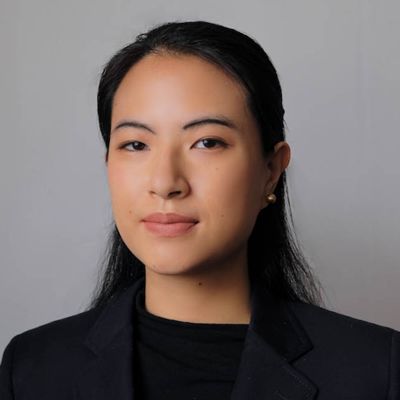
Kimberly Go, CFBA, CFWA, is assistant vice president of her family’s business and previously a consultant at Premier Family Business Consulting. She is a third-generation member of her family business and graduated from Northwestern University with a double major in journalism and economics. Kimberly is interested in conflict resolution, succession planning, and educating the rising generation. She can be reached at kimberlychristinego@gmail.com.

View this edition in our enhanced digital edition format with supporting visual insight and information.


